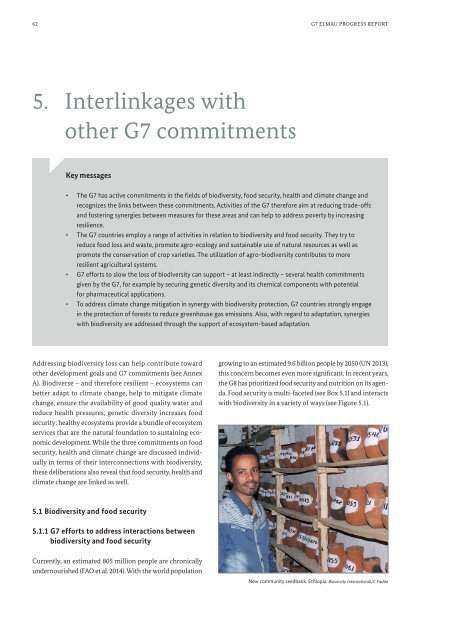G7-Elmau-Progress-Report-2015-Biodiversity-A-vital-foundation-for-sustainable-development
G7-Elmau-Progress-Report-2015-Biodiversity-A-vital-foundation-for-sustainable-development
G7-Elmau-Progress-Report-2015-Biodiversity-A-vital-foundation-for-sustainable-development
You also want an ePaper? Increase the reach of your titles
YUMPU automatically turns print PDFs into web optimized ePapers that Google loves.
62 <strong>G7</strong> ELMAU PROGRESS REPORT5. Interlinkages withother <strong>G7</strong> commitmentsKey messages• The <strong>G7</strong> has active commitments in the fields of biodiversity, food security, health and climate change andrecognizes the links between these commitments. Activities of the <strong>G7</strong> there<strong>for</strong>e aim at reducing trade-offsand fostering synergies between measures <strong>for</strong> these areas and can help to address poverty by increasingresilience.• The <strong>G7</strong> countries employ a range of activities in relation to biodiversity and food security. They try toreduce food loss and waste, promote agro-ecology and <strong>sustainable</strong> use of natural resources as well aspromote the conservation of crop varieties. The utilization of agro-biodiversity contributes to moreresilient agricultural systems.• <strong>G7</strong> ef<strong>for</strong>ts to slow the loss of biodiversity can support – at least indirectly – several health commitmentsgiven by the <strong>G7</strong>, <strong>for</strong> example by securing genetic diversity and its chemical components with potential<strong>for</strong> pharmaceutical applications.• To address climate change mitigation in synergy with biodiversity protection, <strong>G7</strong> countries strongly engagein the protection of <strong>for</strong>ests to reduce greenhouse gas emissions. Also, with regard to adaptation, synergieswith biodiversity are addressed through the support of ecosystem-based adaptation.Addressing biodiversity loss can help contribute towardother <strong>development</strong> goals and <strong>G7</strong> commitments (see AnnexA). Biodiverse – and there<strong>for</strong>e resilient – ecosystems canbetter adapt to climate change, help to mitigate climatechange, ensure the availability of good quality water andreduce health pressures; genetic diversity increases foodsecurity; healthy ecosystems provide a bundle of ecosystemservices that are the natural <strong>foundation</strong> to sustaining economic<strong>development</strong>. While the three commitments on foodsecurity, health and climate change are discussed individuallyin terms of their interconnections with biodiversity,these deliberations also reveal that food security, health andclimate change are linked as well.growing to an estimated 9.6 billion people by 2050 (UN 2013),this concern becomes even more significant. In recent years,the G8 has prioritized food security and nutrition on its agenda.Food security is multi-faceted (see Box 5.1) and interactswith biodiversity in a variety of ways (see Figure 5.1).5.1 <strong>Biodiversity</strong> and food security5.1.1 <strong>G7</strong> ef<strong>for</strong>ts to address interactions betweenbiodiversity and food securityCurrently, an estimated 805 million people are chronicallyundernourished (FAO et al. 2014). With the world populationNew community seedbank. Ethiopia. Bioversity International/C.Fadda


